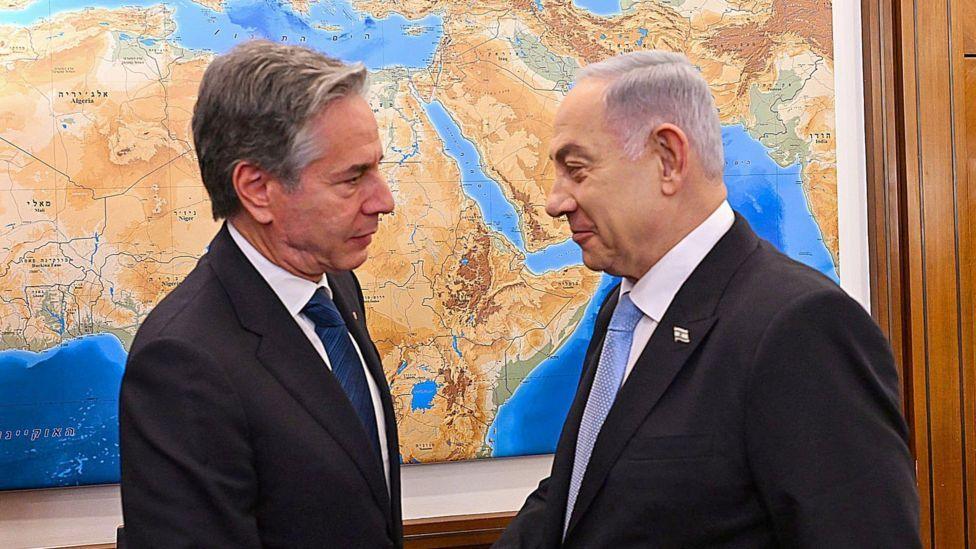US criticises Israeli PM's 'maximalist' ceasefire stance

US Secretary of State Antony Blinken (left) had a three-hour meeting with Israeli PM Benjamin Netanyahu on Monday
- Published
A senior US administration official has pushed back at reported comments by Benjamin Netanyahu, accusing the Israeli prime minister of making “maximalist statements” that are “not constructive to getting a ceasefire deal across the finish line”.
It comes in the midst of an intense round of regional diplomacy by US Secretary of State Antony Blinken, as Washington tries to drive forward progress on a ceasefire and hostage release deal.
On Monday, Mr Blinken had talks lasting three hours with the Israeli leader in Jerusalem.
He later said Mr Netanyahu had accepted Washington’s so-called “bridging proposal” aimed at trying to solve sticking points and bring Israel and Hamas closer to a deal.
Israel accepts 'bridging proposal' for ceasefire deal - Blinken
- Published19 August 2024
Six hostages' bodies retrieved from Gaza tunnels, says IDF
- Published20 August 2024
According to an Israeli media report, Mr Netanyahu later told a meeting of hostage families that he "convinced" Mr Blinken that the deal must see Israeli troops remaining in areas of Gaza he described as “strategic military and political assets”, including along the southern border with Egypt.
The reported comments appear to have irritated the US administration.
"We saw the prime minister's comments, specifically on some of these items," said the senior official who spoke on condition of anonymity.
"We’re certainly not going to negotiate in public but what I can say is that the only thing Secretary Blinken and the United States are convinced of is the need for getting a ceasefire proposal across the finish line."
"We fully expect that… if Hamas were also to also accept this bridging proposal, discussions will continue on some of the more technical... details.
“I would also just add that maximalist statements like this are not constructive to getting a ceasefire deal across the finish line and they certainly risk the ability of implementing level, working level and technical talks to be able to move forward when both parties agree to a bridging proposal.”
The senior official’s remarks followed Tuesday’s round of talks between Mr Blinken and Egyptian President Abdel Fattah al-Sisi in the coastal city of El-Alamein.
Egyptian officials are said to be strongly opposed to the idea of Israeli troops remaining along Egypt's border in Gaza.
Following his stop in Egypt, Mr Blinken travelled on to Qatar for further talks in Doha - the last stop on his Middle East tour.
The BBC has been travelling with the secretary of state and asked him about the conversation shortly before he left Doha.
He revealed for the first time that the American bridging proposal included a "detailed plan" about Israeli withdrawal from Gaza.
"The agreement is very clear on the schedule and locations of IDF [Israel Defense Forces] withdrawals from Gaza and Israel has agreed to that," said Mr Blinken.
Asked by the BBC whether Mr Netanyahu's reported claim that the Israeli leader had "convinced" Mr Blinken to keep troops in Gaza, he said: "I can't speak to what he's quoted as saying, I can just speak to what I heard from him directly yesterday [Monday] when we spent three hours together," he said.
"[That included] Israel's endorsement of the bridging proposal and thus the detailed plan. And that plan among other things includes a very clear schedule and locations for withdrawals."
Asked whether the proposal was for a "full withdrawal", Mr Blinken said he would not comment on the details of the plan.
Hamas said the latest ceasefire proposals constituted "a coup" against what had been agreed upon in earlier negotiations, and reiterated its wish that a ceasefire plan for Gaza be based on where talks were in July rather than any new rounds of negotiations.